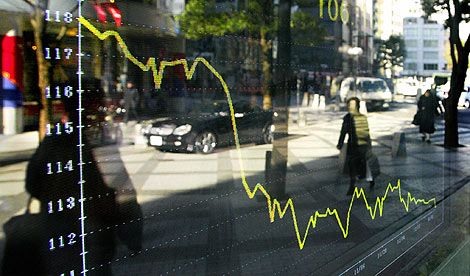Deflation returns to Japan's economy
• Finance minister admits 'sense of crisis' as prices fall
• Government urges Bank of Japan to tackle deflation
Japan's fledgling recovery is under threat from falling prices, the government said today, as it conceded that deflation had returned to the world's second-biggest economy after a three-year gap.
The finance minister, Hirohisa Fujii, spoke of a "sense of crisis" over falling prices – the problem that plagued Japan during what's known as its "lost decade" of economic stagnation in the 1990s.

Japan's economic recovery is under threat as falling prices and a stagnant job market prompt fresh concerns. Photograph: Kazuhiro Nogi/AFP Photo
Japan's fledgling recovery is under threat from falling prices, the government said today, as it conceded that deflation had returned to the world's second-biggest economy after a three-year gap.
The finance minister, Hirohisa Fujii, spoke of a "sense of crisis" over falling prices – the problem that plagued Japan during what's known as its "lost decade" of economic stagnation in the 1990s.
Fujii's comments came as the Bank of Japan (BoJ) kept interest rates at 0.1% and upgraded its assessment of the economy amid modest rises in exports and private consumption.
The cabinet office said in its monthly report: "Recent price developments show that the Japanese economy is in a mild deflationary phase." However, the central bank appeared to ignore the report's implication that it had to do more to tackle deflation, saying the recent fall in the consumer price index was likely to slow.
Fujii told a news conference: "Monetary policy is absolutely vital. It is like the lifeblood of the economy, so I want the BoJ to respond appropriately."
The return of deflation for the first time since August 2006 had been expected but officials fear that flat consumption and a stagnant job market will strengthen the possibility of a double-dip recession. In the 1990s, consumers stopped spending in the expectation that prices would fall further. Faced with falling profits, companies were forced to squeeze wages, shed jobs and cut production.
Hiromichi Shirakawa, of Credit Suisse, warned: "If consumers expect prices to fall further, they will stop spending and try to save. That's the biggest worry. That would have a knock-on effect on companies, on the government and everywhere."
The BoJ upgraded its assessment of the economy for the third straight month but warned that the pace of recovery would remain slow until at least the middle of 2010. "Japan's economy is picking up mainly due to various policy measures taken at home and abroad," it said, citing stimulus-driven improvements in exports and production. But it added: "The momentum for a self-sustaining recovery in domestic private demand remains weak."
Observing the bank's independence, the government did not offer policy advice in its report, though some investors interpreted the reference to deflation as pressure to return to quantitative easing – flooding the market with cash to boost economic activity.
Japan's quantitative easing began in 2001 after two years of falling prices and ended in 2006, when the economy finally moved out of deflation after nearly 20 years. In that time the BoJ bought government bonds and other assets and raised commercial banks' reserve accounts sixfold. Interest rates stayed close to zero.
Mondo Cane (1962)

No comments:
Post a Comment